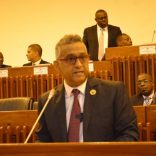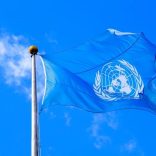Mozambique: District committees for FIDEL evaluation sworn in
Mozambique: Paris Club deal to extend debt moratorium to June, deferring $250M

In file CoM
– The government of Mozambique and the Paris Club of creditor countries have reached an agreement to extend the former’s debt moratorium until June, enabling the country to defer some $250 million (€204.4 million) in payments.
“The representatives of the Paris Club Creditor Countries have accepted to provide to the Republic of Mozambique an extension of the time-bound suspension of debt service due from 1st January to 30st June 2021,” reads a note posted on the Paris Club website.
The club is an informal group of major creditor countries, set up in 1956, whose declared aim is to seek coordinated and sustainable solutions to the payment difficulties of debtor countries.
A Debt Service Suspension Initiative (DSSI) was launched by the G20 in April last year to guarantee a moratorium on debt payments of the most indebted countries to the most developed countries and multilateral financial institutions, with an initial deadline of December 2020. This was later extended to June this year, with the possibility of a further six-month extension.
According to the latest figures from the World Bank, published last week, the extension of the moratorium will allow for a postponement of payments by Mozambique worth $250.2 million.
“The Government of the Republic of Mozambique is committed to devote the resources freed by this initiative to increase spending in order to mitigate the health, economic and social impact of the COVID-19 crisis,” the Paris Club text states, adding that the country “is also committed to seek from all its other bilateral official creditors a debt service treatment that is in line with [what was] agreed” with the Paris Club.
“The members of the Paris Club participating in this reorganisation are the governments of Brazil, France, Japan, the Republic of Korea, Russia and Spain,” the note states.
The DSSI does not require debtor countries to stop honouring financial commitments to private creditors, such as commercial banks or holders of sovereign debt securities. As a result Mozambique can benefit from this payment relief while continuing to service public debt, so avoiding a downgrade by rating agencies.
The DSSI only suggests that countries seek relief for debt owed to the private sector, while the Common Framework, approved by the G20 in November, argues that private creditors must be approached, although it does not say explicitly what happens if there is no agreement between debtor and creditor.
Ethiopia’s application to join the framework in late January rattled investors, who saw the country as the first of several sub-Saharan African countries to apply for debt relief. The executive director of the United Nations Economic Commission for Africa (UNECA) has also predicted that more countries will follow the example of Ethiopia, as well as Chad and Zambia.
The proposal presented by the G20 and Paris Club in November is the second phase of the DSSI, launched in April, and which was widely criticised for not obliging the private sector to participate in the effort, since it would open the way for indebted countries not to pay official and bilateral creditors – countries and multilateral financial institutions – while continuing to service debt owed to private entities.
The Common Framework aims to bring all involved on board, including China’s private and public banks, which have become the largest creditors of the governments of developing countries, particularly those in Africa.
The moratorium on debt repayment was one of the instruments launched to bridge the $345-billion financing gap that is set to open up by 2023 in Africa alone, according to calculations by the International Monetary Fund.
So far, of the 73 countries eligible to benefit from the DSSI, more than 40 have applied for formal membership, so securing potential savings of more than $5 billion, according to the latest calculations by the World Bank.












Leave a Reply
Be the First to Comment!
You must be logged in to post a comment.
You must be logged in to post a comment.